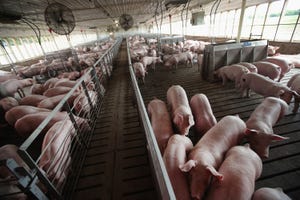NPPC urges Congress to increase agricultural inspector funding
APHIS requested $250 million since its inspection user fees have decreased significantly because of COVID-19 impacts on international travel and trade.
February 18, 2022

The National Pork Producers Council is calling on Congress to provide funding for USDA's Animal and Plant Health Inspection Service Agricultural Quarantine Inspection program. The AQI program funds the Department of Homeland Security's Bureau of Customs and Border Protection agricultural inspectors who work at U.S. ports of entry to interdict contraband that could carry pests and diseases that would harm U.S. agriculture and the environment.
APHIS requested $250 million since its inspection user fees have decreased significantly because of COVID-19 impacts on international travel and trade. NPPC previously led the effort to secure $635 million in emergency funding in 2020 to ensure this critical program is not jeopardized.
NPPC also supports the hiring of additional CBP inspectors, as the agency is still several hundred inspectors short of the number needed to protect U.S. agriculture against pests and foreign animal diseases, including African swine fever.
In 2020, NPPC led the effort to pass the Protecting America's Food and Agriculture Act, which authorized CBP to hire an additional 720 agricultural inspectors.
In a related matter, the Senate Committee on Homeland Security and Governmental Affairs this week held a hearing on gaps in the country's biosecurity preparedness and ways to fill them. Witnesses Christopher Currie, director of Homeland Security and Justice at the U.S. Government Accountability Office; Asha George, executive director of the Bipartisan Commission on Biodefense; and Gerald Parker Jr., associate dean for Global One Health College of Veterinary Medicine and Biomedical Sciences at Texas A&M University said that while progress has been made, the United States is not sufficiently prepared for biological threats.
Source: National Pork Producers Council, which is solely responsible for the information provided, and wholly owns the information. Informa Business Media and all its subsidiaries are not responsible for any of the content contained in this information asset.
About the Author(s)
You May Also Like



